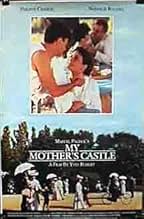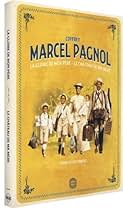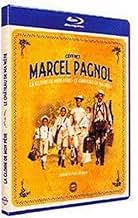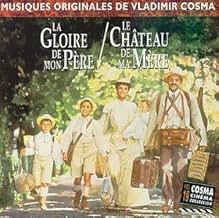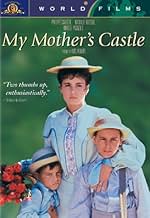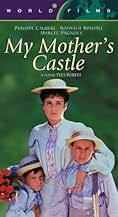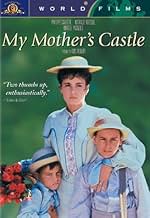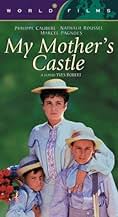AVALIAÇÃO DA IMDb
7,6/10
6 mil
SUA AVALIAÇÃO
Todas as férias, Marcel e sua família vão para sua casa de campo perto de Marselha. Durante uma dessas férias, ele conhece Isabelle, uma garota bonita, mas convencida.Todas as férias, Marcel e sua família vão para sua casa de campo perto de Marselha. Durante uma dessas férias, ele conhece Isabelle, uma garota bonita, mas convencida.Todas as férias, Marcel e sua família vão para sua casa de campo perto de Marselha. Durante uma dessas férias, ele conhece Isabelle, uma garota bonita, mas convencida.
- Direção
- Roteiristas
- Artistas
- Prêmios
- 1 vitória e 6 indicações no total
Jean-Pierre Darras
- Récitant
- (narração)
- …
- Direção
- Roteiristas
- Elenco e equipe completos
- Produção, bilheteria e muito mais no IMDbPro
Avaliações em destaque
"O for one of those hours of gladness. Gone alas with our youth too soon"*
My Mother's Castle picks up where My Father's Glory left off, tracing young Marcel's life over the next year as his enchanting remembrances of things past comes full circle. If you were nostalgic for the south of France after seeing My Father's Glory, you do not have to wait long to once again smell the sprigs of wild thyme. After resuming their life again in Marseilles, the family: Joseph (Philippe Caubere), Augustine (Nathalie Roussel), Marcel (Julien Ciamaca), brother Paul (Victorien Delamare) and baby sister decide to return to Provence for Christmas and then again at Easter.
Marcel is reunited with his friend Lili but soon discovers the charms of women in the person of Isabelle (Julie Timmerman), a somewhat snooty young lady who takes on the affectation of nobility to impress (and dominate) Marcel. Their relationship shows promise but comes to an abrupt end early in the film when Isabelle's family suddenly leaves. Soon Augustine has the idea of returning to their country home each weekend. This, however, presents a small problem. Aside from the fact that Joseph, with the aid of Augustine's charms, must rearrange his teaching schedule, the family must walk five miles from the trolley station to their country home using up much of their weekend time.
This problem is solved when Joseph meets Bouzique (Philippe Uchan), one of his former pupils. Bouzique is a canal guard who shows them how to cut eight hours from their weekly walk by illegally cutting over other people's property that runs along the canal. At first Joseph is reluctant but finally agrees. This takes on an air of great adventure and humor as Bouzique gives a key to Joseph who must unlock the doors on each estate that stand in his way. The walk becomes the focus of the film, as everyone in the group must carefully avoid drawing attention to themselves. One house in particular, owned by a grouchy caretaker and a surly dog named Masher, causes Augustine to be quite fearful. Like My Father's Glory, My Mother's Castle consists of charming vignettes that evoke a simpler time. The film works its way into our heart because the characters care about each other and we care about them. Like all idealized reflections of the past, however, it ultimately gives way to bittersweet reality, reminding us very gently how soon youth passes, but as poet Shelley put it, "Our sweetest songs are those that tell of saddest thought".
*From Kerry Dances by James Lynam Molloy
My Mother's Castle picks up where My Father's Glory left off, tracing young Marcel's life over the next year as his enchanting remembrances of things past comes full circle. If you were nostalgic for the south of France after seeing My Father's Glory, you do not have to wait long to once again smell the sprigs of wild thyme. After resuming their life again in Marseilles, the family: Joseph (Philippe Caubere), Augustine (Nathalie Roussel), Marcel (Julien Ciamaca), brother Paul (Victorien Delamare) and baby sister decide to return to Provence for Christmas and then again at Easter.
Marcel is reunited with his friend Lili but soon discovers the charms of women in the person of Isabelle (Julie Timmerman), a somewhat snooty young lady who takes on the affectation of nobility to impress (and dominate) Marcel. Their relationship shows promise but comes to an abrupt end early in the film when Isabelle's family suddenly leaves. Soon Augustine has the idea of returning to their country home each weekend. This, however, presents a small problem. Aside from the fact that Joseph, with the aid of Augustine's charms, must rearrange his teaching schedule, the family must walk five miles from the trolley station to their country home using up much of their weekend time.
This problem is solved when Joseph meets Bouzique (Philippe Uchan), one of his former pupils. Bouzique is a canal guard who shows them how to cut eight hours from their weekly walk by illegally cutting over other people's property that runs along the canal. At first Joseph is reluctant but finally agrees. This takes on an air of great adventure and humor as Bouzique gives a key to Joseph who must unlock the doors on each estate that stand in his way. The walk becomes the focus of the film, as everyone in the group must carefully avoid drawing attention to themselves. One house in particular, owned by a grouchy caretaker and a surly dog named Masher, causes Augustine to be quite fearful. Like My Father's Glory, My Mother's Castle consists of charming vignettes that evoke a simpler time. The film works its way into our heart because the characters care about each other and we care about them. Like all idealized reflections of the past, however, it ultimately gives way to bittersweet reality, reminding us very gently how soon youth passes, but as poet Shelley put it, "Our sweetest songs are those that tell of saddest thought".
*From Kerry Dances by James Lynam Molloy
When my cousin and I rented this film, we had no idea that it was French and in subtitles. Although I am in the process of learning the French language (slowly), I was a bit taken aback by the fact that I had to watch it in subtitles. However, after the first 10 minutes I was completely immersed in the beautiful countryside, and the flow of the language.
First of all, there is no specific plot to this story. One event flows into the next, but they are unrelated, held together by the characters. But the acting and the landscapes are beautiful and ethereal, and you wish that you could be there.
This is not to say that the film doesn't make sense, it most certainly does, and there is a point to it. The end comes on a bit abruptly, although it too is gentle and poignant.
As long as you can read fast enough to keep up with the subtitles (and after a bit you don't even notice you're doing it), this is a lovely film to see. It's quite suitable for all ages, but as it IS in subtitles, you don't want to watch it with children too young to read fast enough.
A lovely film, very French, and very beautiful. 10/10, definitely.
First of all, there is no specific plot to this story. One event flows into the next, but they are unrelated, held together by the characters. But the acting and the landscapes are beautiful and ethereal, and you wish that you could be there.
This is not to say that the film doesn't make sense, it most certainly does, and there is a point to it. The end comes on a bit abruptly, although it too is gentle and poignant.
As long as you can read fast enough to keep up with the subtitles (and after a bit you don't even notice you're doing it), this is a lovely film to see. It's quite suitable for all ages, but as it IS in subtitles, you don't want to watch it with children too young to read fast enough.
A lovely film, very French, and very beautiful. 10/10, definitely.
I first saw Le Château de ma mère and La Gloire de mon père shortly after their release in 1990. At first, I gave a higher ranking to Le Château. I just saw the two movies again, and now it's La Gloire who's coming on first.
But it is not to say that Le Château is not a good movie. It's an EXCELLENT movie. The saga of Marcel continues. Young Marcel Pagnol that is. The cast is again great: Philippe Caubère and Nathalie Roussel shine, Juline Ciamaca does a great job as Marcel.
And, once again, we get a taste of life in France's countryside, its colors, its ways of doing things. Great!
Too bad, there was not a third movie to follow La Gloire and Le Château.
See this one!
Out of 100, I gave it 86. That's good for ***½ out of ****. I gave La Gloire de mon père the same star rating, but 87 out of 100.
Seen again at home, in Toronto, on August 11th, 2002.
But it is not to say that Le Château is not a good movie. It's an EXCELLENT movie. The saga of Marcel continues. Young Marcel Pagnol that is. The cast is again great: Philippe Caubère and Nathalie Roussel shine, Juline Ciamaca does a great job as Marcel.
And, once again, we get a taste of life in France's countryside, its colors, its ways of doing things. Great!
Too bad, there was not a third movie to follow La Gloire and Le Château.
See this one!
Out of 100, I gave it 86. That's good for ***½ out of ****. I gave La Gloire de mon père the same star rating, but 87 out of 100.
Seen again at home, in Toronto, on August 11th, 2002.
I really enjoyed this film tremendously. There were no grand special effects, dazzling action or exciting twists--just unbelievably beautiful film-making! This is a biographical tale based on the childhood of the great French director/writer Marcel Pagnol. In fact, it is because of my love of his films that I sought out this videotape and the prequel, My Father's Glory. If you have not seen the Fanny trilogy (or the single film by the same title starring Leslie Caron), The Baker's Wife, Harvest, Manon of the Spring or any of his other films, try to see them!! What makes all these films so wonderful is the superb writing and how his characters come to life. They are charming, full of foibles and yet quite lovable! And this is definitely true in this movie as well.
This movie picks up right where the prequel stopped--complete with the same actors. This was possible, as the films were filmed together and came out the same year.
Of the two films, My Mother's Castle is definitely the best--though they are both extraordinary films. What I liked about this film was that it was able to evoke so much emotion within me. For example, near the end I found myself laughing loudly at the scene involving the VERY nasty guard as he gets his comeuppance! Then, only minutes later I was sobbing at the profound sadness about Pagnol's later life (after the main story is over, there is a gut-wrenching epilogue). It's profoundly sad, but since it is based on real life, so necessary.
Watch this film with your entire family--even the cynical members of the family are sure to enjoy!
This movie picks up right where the prequel stopped--complete with the same actors. This was possible, as the films were filmed together and came out the same year.
Of the two films, My Mother's Castle is definitely the best--though they are both extraordinary films. What I liked about this film was that it was able to evoke so much emotion within me. For example, near the end I found myself laughing loudly at the scene involving the VERY nasty guard as he gets his comeuppance! Then, only minutes later I was sobbing at the profound sadness about Pagnol's later life (after the main story is over, there is a gut-wrenching epilogue). It's profoundly sad, but since it is based on real life, so necessary.
Watch this film with your entire family--even the cynical members of the family are sure to enjoy!
Almost three decades later,Yves Robert comes back to what he does best:childhood movies."La guerre des boutons" (1962) was the first work featuring almost only brats.It was a timeless blockbuster in France and an (English or Irish) remake was made a few years ago.
Yves Robert tackles here Pagnol 's autobiographical books and transfers them to the screen with taste ,humor and magic.Magic is everywhere as Robert perfectly recreates those little simple pleasures of long ago."Le château de ma mère" is the follow-up to "La gloire de mon père".Both movies are likable,Robert showing tenderness for his characters:The enthusiastic atheist father (Philippe Caubère), the mother everybody would like to have (Nathalie Roussel),their two children ,Marcel -who would become the great director and writer- and his brother"petit Paul", the Christian uncle Jules who prays for his heathen brother-in-law,and plays the occasional Father Christmas. A lot of colorful secondary characters adds to the enchantment:Lili,the little boy of the garrigue,a girlie,some kind of stuck-up thing,a noble who's a true gentleman,a wicked warden(One of Jean Carmet's last parts) who's got instructions by way of heart.
The main difference between "le château de ma mère" and the first part "la gloire de mon père" lies in the fact that the former opens the gates of life(not only the gates the father illegally opens) .The conclusion is very harsh,but Robert avoids pathos and melodrama.It does not prevent us,though,after three hours (the two movies together) in these green pastures of childhood paradise,from getting a bitter taste in the mouth.
Robert knows it:so he ends his work with a wonderful epilogue(faithful to the book) which thoroughly justifies the title.And the audience will leave the Provence,while thinking that here or elsewhere,dreams may come true.
As Pagnol wrote at the end of his book:"life is made of small pleasures and big grieves :don't you tell it to the children"
Yves Robert tackles here Pagnol 's autobiographical books and transfers them to the screen with taste ,humor and magic.Magic is everywhere as Robert perfectly recreates those little simple pleasures of long ago."Le château de ma mère" is the follow-up to "La gloire de mon père".Both movies are likable,Robert showing tenderness for his characters:The enthusiastic atheist father (Philippe Caubère), the mother everybody would like to have (Nathalie Roussel),their two children ,Marcel -who would become the great director and writer- and his brother"petit Paul", the Christian uncle Jules who prays for his heathen brother-in-law,and plays the occasional Father Christmas. A lot of colorful secondary characters adds to the enchantment:Lili,the little boy of the garrigue,a girlie,some kind of stuck-up thing,a noble who's a true gentleman,a wicked warden(One of Jean Carmet's last parts) who's got instructions by way of heart.
The main difference between "le château de ma mère" and the first part "la gloire de mon père" lies in the fact that the former opens the gates of life(not only the gates the father illegally opens) .The conclusion is very harsh,but Robert avoids pathos and melodrama.It does not prevent us,though,after three hours (the two movies together) in these green pastures of childhood paradise,from getting a bitter taste in the mouth.
Robert knows it:so he ends his work with a wonderful epilogue(faithful to the book) which thoroughly justifies the title.And the audience will leave the Provence,while thinking that here or elsewhere,dreams may come true.
As Pagnol wrote at the end of his book:"life is made of small pleasures and big grieves :don't you tell it to the children"
Você sabia?
- CuriosidadesPagnol had been planning to direct a version of the story as early as 1968 but the project was never completed.
- Citações
Marcel Pagnol: Such is the life of a man. Moments of joy, obliterated by unforgettable sadness. There's no need to tell the children that.
Principais escolhas
Faça login para avaliar e ver a lista de recomendações personalizadas
- How long is My Mother's Castle?Fornecido pela Alexa
Detalhes
- Data de lançamento
- País de origem
- Idiomas
- Também conhecido como
- My Mother's Castle
- Locações de filme
- Empresas de produção
- Consulte mais créditos da empresa na IMDbPro
Bilheteria
- Faturamento bruto nos EUA e Canadá
- US$ 1.477.071
- Faturamento bruto mundial
- US$ 1.477.071
- Tempo de duração
- 1 h 38 min(98 min)
- Mixagem de som
- Proporção
- 1.85 : 1
Contribua para esta página
Sugerir uma alteração ou adicionar conteúdo ausente

![Assistir a Bande-annonce [OV]](https://m.media-amazon.com/images/M/MV5BNjcxYzZiNGEtMDIyNC00NWZjLWI3YWMtYjBiZTUwNjIzMzNjXkEyXkFqcGdeQXRyYW5zY29kZS13b3JrZmxvdw@@._V1_QL75_UX500_CR0)
